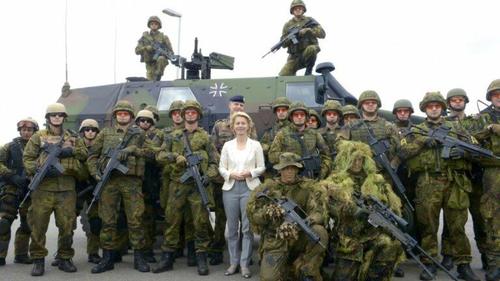By Tyler Durden
The crisis in Afghanistan is now being used as a justification for starting a process of militarization in Europe.
The German government appealed to the EU so that the experience in Central Asia serves as a lesson for the bloc to implement measures to create its own military force, as a way to respond quickly and efficiently to crisis situations like the current one.
The EU fears not only the advance of terrorism in Afghan territory, but also its expansion to the European continent as a consequence of the migratory flow. However, at present, the bloc’s main concern is how to operate emergency evacuations, ensuring the safety and physical integrity of European citizens abroad during events similar to the Taliban seizure of Kabul.
Indeed, European efforts to strengthen its security through a military coalition are not recent. In 2007, a system of battlegroups of 1,500 soldiers was created to initiate the bloc’s military activities. However, the project came to a standstill and troops were never mobilized for relevant training or combat activities, mainly due to bureaucratic impasses, disputes over funding and various other disagreements between EU member countries. Some years ago, French President Emmanuel Macron had also proposed the creation of a European army, but the debate was quickly forgotten.

German Defense Minister proposes that Europe creates a military coalition to act in emergency situations to help European citizens abroad.
Confidence in Washington’s competence to ensure the security of the European continent has caused the EU to abandon its military efforts and act negligently on this issue for many years. But current events have brought this issue back into the debate as the US attitude has revealed how there can be no full reliance on foreign military forces. The abrupt evacuation of the US armed forces has shown how, in emergency situations, a foreign military power will prioritize its own interests – which is why Europeans cannot fully rely on US willingness to cooperate with the EU. Currently, several European citizens remain on Afghan soil suffering from various dangers. To guarantee the safety of diplomats, businessmen and NGO workers, European countries had to sign agreements with the Taliban – which would not be necessary if there were military forces strong enough to evacuate citizens.
In this regard, the German defense minister, Annegret Kramp-Karrenbauer, made a public appeal on Thursday for the EU to form a “coalition of the willing” to act in situations in which the members of the bloc decide together on the need for intervention. These were her words: “The military capabilities in EU member countries of exist (…) The key question for the future of the European security and defense police is how we finally use our military capabilities together (…) In the EU, coalitions of the willing could act after a joint decision of all”.
It is not by chance that these words came from a German official. Berlin has recently been working deeply on building a more powerful defense force. Its disputes over interests with the US in recent years – particularly with regard to Nord Stream 2 – have made it clear that there can be no total reliance on alliances with foreign powers. However, Germany still remains extremely weak on the military issue – although it is stronger than most European states -, which is now leading the country to seek to consolidate stronger alliances at the regional level.
The proposal tends to please the governments of small European states. In the same vein, Karrenbauer’s pronouncement is extremely consistent with Macron’s quest for European “strategic autonomy”, which may lead to Paris-Berlin bilateral dialogues in the near future. Macron has repeatedly suggested increasing European military capacity in the past precisely because France is having its own “Afghanistan” in Mali and the Maghreb. The situation of the French presence in Africa is gradually more complicated and it is very likely that soon there will be a need for emergency evacuation of French citizens in several African countries. France is strong enough to handle this kind of situation alone, but obviously it would be interesting to be able to count on the support of troops from other European states, which is why a coalition sounds very strategic for Paris.
In fact, any form of improving sovereignty is positive, both for national states and for regional blocs. Europe really needs to learn to deal with situations in which the US and NATO cannot or do not want to be involved. Despite the ideological proximity, the US and the EU have several strategic disagreements that must be considered, while, on the other hand, the differences between European states are less relevant, which makes it more advantageous to invest in alliances at the regional level.
What must be avoided, however, is that this type of military force becomes a mere branch of NATO. If Europe really consolidates this project, Washington will try to use such an alliance for its own interests, allocating the coalition’s troops to NATO’s military programs aimed at confronting and provoking US geopolitical rivals. This would be the worst-case-scenario for all sides and is something to be prevented in every way possible.






Every Country has the right to defend itself! Regardless of what other say. It is The People who are important, NOT the Politician’s! This Administration has proven that they can not be trusted to protect anybody! Us American’s have been sold a bill of goods that are spoiled and rotten! Don’t be mislead by these Politician’s who talk gibberish and demonstrate ugliness!